Out of Shadows by Jason Wallace (Andersen)
Review by Edna Hobbs
The idea behind this book has great potential: juxtaposing the view of Robert Mugabe held by the outside world at the time of Zimbabwean Independence with what we know of his atrocities now.
An English boy, Robert Jacklin goes to a private Zimbabwean boarding school in 1983, just as the country begins its post-war era. His father impresses upon him how wonderful Robert Mugabe is, ascribing to him the role of reconciler.
At the heart of the story lies the conundrum that opens the novel: if you’d had foreknowledge of Hitler’s evil, would you have killed him given the opportunity? Would it have been right to kill Mugabe when the land-grabbing and massacres began? 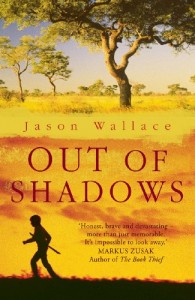
So why was this a story I just couldn’t connect with? I grew up in South Africa and I’ve lived so many of the situations described. Only, I haven’t, because Wallace’s characters are plot devices. He tries to give Ivan a loving side briefly, but it isn’t rooted in anything we see elsewhere. Wallace shows the cruelty of both groups, but very little of the kindness suffering people show each other.
No one is real. Even the narrator struggling to discern right from wrong leaves me cold. The savagery is unremitting. That those unthinkable crimes are committed in Africa daily is very real and does need to be brought to the West’s attention again, but this is too polemic to make good reading, but the message is worth a story.
The Bride’s Farewell by Meg Rosoff (Puffin)
Review by Lesley Finlay
Meg Rosoff’s beautifully written pastoral tells the story of Pell Ridley, a strong independent young woman who runs away the night before her wedding to a country lad. Refusing to be confined to a life of a drudgery and child-bearing, Pell heads for the Salisbury Horse Fair to find work with just her horse, a hand-made blanket and her youngest, mute brother.
If the reader was in any doubt that this was not quite ‘the done thing’, then the scene where she tries to find work at the Fair, will do it.
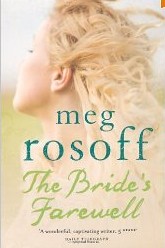
The calamities that befall our heroine are plotted at just the right pace; Rosoff allows the story to space to grow, for us to understand Pell’s motivation.
The one discordant note is the chapter that deals with her homecoming – whipped through, a plot convenience – this was a real shame as the tone had been spot on until then.
Rosoff writes beautifully, and this novel has real echoes of Thomas Hardy themes – the loner finding his or her way in the world, endurance, and a colourful portrayal of country life. She won the Carnegie Medal in 2007 with her novel Just In Case – could this be her second win?
Prisoner of the Inquisition by Theresa Breslin (Doubleday Childrens)
Review by Julia Pirie
Theresa Breslin’s novel Prisoner of the Inquisition begins and ends with a woman being burnt at the stake for heresy. It is a time of terror. Isabella of Castile and Ferdinand of Aragon are reclaiming Spain from the Moors and the Inquisition is conducting its holy war. No non-Christian is safe; even Christians cannot afford to be complacent.
While the setting is 15th century, the issues ring with topical resonance – religious intolerance, social injustice, personal courage – and love, both romantic and familial.
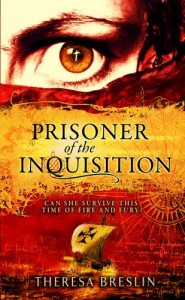
Two teenagers tell the story: Zarita, the daughter of a wealthy magistrate, and Saulo, son of a beggar. This narrative strategy enables both voices to carry equal weight while allowing for dramatic first-person story-telling. Although the experienced Breslin handles it skillfully, I find this device irritating in the way the reader is constantly brought up short for a change of viewpoint, some later chapters dwindling to little more than a page.
Zarita’s narrative arc is the more defined. From a rather spoilt, selfish child, she develops into a young woman prepared to pay the ultimate price to protect those she loves. Experience tempers Saulo’s character too though Breslin gives neither an easy ending.
Adults feature on the periphery as in all successful books for children/teens but while Zarita’s aunt (a nun) and Saulo’s mentor (a sea-captain) are convincingly drawn and the portrait Tomás de Torquemada is chillingly evil, the presence of Christopher Columbus, although historically accurate, seems a slightly jarring addition.
That said, Prisoner of the Inquisition is a confidently written, compelling read. It’s full of suspense and there are some memorable scenes particularly those in which the Inquisition comes to town and later when Zarita becomes their eponymous prisoner.
Monsters of Men by Patrick Ness (Walker)
Review by Allison Johnston
Could I read Monsters of Men, the third and final part of Patrick Ness’s celebrated Chaos Walking series without reading the first two tomes?. The answer is yes, an additional surprise given that this is not my usual cup of tea. However, there is no ‘previously in Chaos Walking…’ so the reader has to dive in, although some background on the key players might be useful.

One is straight into the heart of the action. Todd has saved the Mayor’s life but regrets it as he seems to want total destruction of the enemy, the terrifying Spackle. Viola who was left with two broken ankles following an attack which kills her parents, is taken under the wing of Mistress Coyle, whose motivations, like those of the Mayor, are ambiguous.
Ness tackles some tricky themes. The young people want the war to end but, as key players, learn that life is far more complicated with more contradictions than they wish to face, particularly as they are caught in the middle of the rivalry between Mistress Coyle and the Mayor.
Fans will love this third instalment which is written with clarity. The alternate first person narrative of Todd and Viola helps to carry the action at breakneck pace.
Clutching Carnegie nominations for the first two parts, this may well be Ness’s lucky year.
The Death Defying Pepper Roux by Geraldine McCaughrean (OUP Oxford)
Review by Elena Mozzato
It’s the morning of Paul Roux’s 14th birthday, and he knows he’s going to die. His death was predicted by his Aunt Mireille who was told so by Saint Constance in a vision. However, Paul – nicknamed Pepper – is not ready to die. So he sets off to sea in an attempt to avoid death for as long as possible. During this epic journey, he manages to escape death by hiding behind other people’s identities.
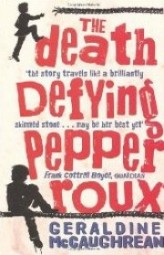
He passes himself off as a sea captain, a telegram boy, a Carmargue guardian, a journalist and a foreign legionnaire. ‘People see what they expect to see, don’t they?’ But no matter where he goes, death is always just around the corner.
Pepper’s family plays a substantial role in the story. Manipulative and oppressive, it stopped investing in him the day he was born, while teaching him the ‘pointlessness of living and the hopelessness of hope’. The figure of Aunt Mereille is particularly obscure. Subtly malign and bigoted, she treats Pepper ‘like a guest who has outstayed his welcome’, making him feel guilty for being alive.
Finely woven and intelligent, the book is not only a dream-like adventure for older children, but also an invitation for adults to leave any sort of scepticism and let themselves go to the power of imagination.
White Crow by Marcus Sedgwick (Orion)
Review by Aliss Langridge
Marcus Sedgwick’s modern gothic thriller White Crow has all the familiar elements of the genre with a host of others thrown in.
There are three voices in this dark novel contrasting the village of Winterfold in 1798 and modern times. A local Rector in 1798 is tortured by unanswered questions about the afterlife, while the lonely sixteen-year-old Rebecca Case is befriended by the mysterious Ferelith, the third voice, who gradually reveals a darker side.
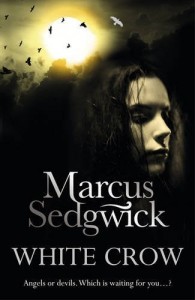
How do their stories connect?
White Crow is an entertaining read with a traditionally gothic atmosphere but it’s the exploration of the scary, dark aspects of the human mind that will leave the lasting impression.


